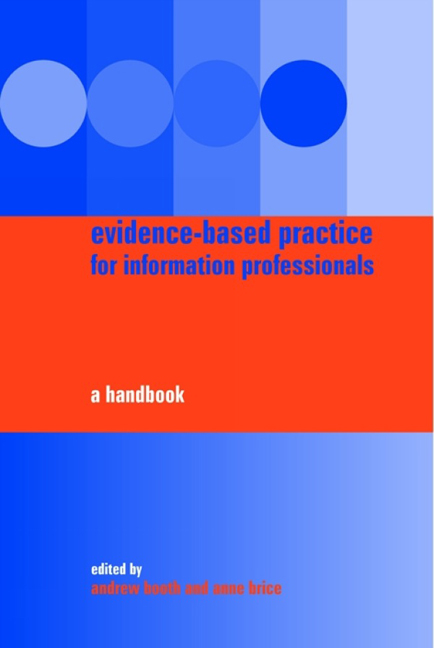Book contents
- Frontmatter
- Contents
- Foreword
- Editors and contributors
- Part 1 The context for evidence-based information practice
- Part 2 Skills and resources for evidence-based information practice
- Part 3 Using the evidence base in practice
- 13 Six domains of evidence-based information practice
- 14 Examining the evidence base for reference services and enquiry work
- Special Topic (A) Provision of a current awareness service for research staff (Guideline)
- 15 The contribution of evidence-based practice to educational activities
- Special Topic (B) How can I train my users? (Evidence Digest)
- 16 An evidence-based approach to collection management
- Special Topic (C) Electronic or paper: how do I manage my journals collection? (Evidence Digest)
- 17 Towards evidence-based management
- Special Topic (D) How do I measure the impact of my service? (Guideline)
- Special Topic (E) Should I charge and, if so, what should I charge for? (Evidence Briefing)
- 18 Evidence-based perspectives on information access and retrieval
- Special Topic (F) What are the characteristics of a good searcher? (Critically Appraised Topic)
- Special Topic (G) Which database, which interface? (Guideline) 251
- 19 Introducing an evidence-based approach to marketing and promotional activities
- Special Topic (H) Determining the information needs of practising nurses postregistration in the UK from 1990 to 2003 (Evidence Digest)
- 20 A future for evidence-based information practice?
- Index
15 - The contribution of evidence-based practice to educational activities
from Part 3 - Using the evidence base in practice
Published online by Cambridge University Press: 08 June 2018
- Frontmatter
- Contents
- Foreword
- Editors and contributors
- Part 1 The context for evidence-based information practice
- Part 2 Skills and resources for evidence-based information practice
- Part 3 Using the evidence base in practice
- 13 Six domains of evidence-based information practice
- 14 Examining the evidence base for reference services and enquiry work
- Special Topic (A) Provision of a current awareness service for research staff (Guideline)
- 15 The contribution of evidence-based practice to educational activities
- Special Topic (B) How can I train my users? (Evidence Digest)
- 16 An evidence-based approach to collection management
- Special Topic (C) Electronic or paper: how do I manage my journals collection? (Evidence Digest)
- 17 Towards evidence-based management
- Special Topic (D) How do I measure the impact of my service? (Guideline)
- Special Topic (E) Should I charge and, if so, what should I charge for? (Evidence Briefing)
- 18 Evidence-based perspectives on information access and retrieval
- Special Topic (F) What are the characteristics of a good searcher? (Critically Appraised Topic)
- Special Topic (G) Which database, which interface? (Guideline) 251
- 19 Introducing an evidence-based approach to marketing and promotional activities
- Special Topic (H) Determining the information needs of practising nurses postregistration in the UK from 1990 to 2003 (Evidence Digest)
- 20 A future for evidence-based information practice?
- Index
Summary
Introduction
This chapter examines issues relating to evaluation of educational interventions. It considers the types of questions that might be framed from an educational perspective, the sources that might supply answers to such questions, and the quality of the evidence base. Whether evidence from education research is put into practice, and barriers to acting on the evidence are also considered. Key studies from within the domain are used to illustrate issues and methods. Educational approaches within an information setting encompass everything from user education to staff development and training. A subsequent special topic examines the evidence base for the training of users in information skills.
What is evidence-based education?
What do we mean by evidence-based education, and what kinds of research might those involved in teaching and learning do? Much existing published research centres on education policy, and very little is actually evidence-based. In addition, much research has been carried out in the context of primary and secondary education, where much of the controversy and public interest lies. In fact, even here Davies et al. (2000) suggest that the evidence base is weak and that ‘there is often not a culture of teachers using research to inform their everyday school practice’. In this chapter we focus on research undertaken with regard to adult and lifelong learning. However we should acknowledge, albeit in passing, the considerable work that exists looking at evidence-based practice in relation to the contribution of the school librarian (Todd, 2001; Todd, 2002a; Todd, 2002b; Todd, 2003).
Evidence-based education is ‘(t)he integration of professional wisdom with the best empirical evidence in making decisions about how to deliver instruction’. The authors of this definition argue that professional wisdom is important for helping to adapt empirical evidence to local situations, and that randomized control trials are the best way to establish empirical evidence.
Fierce debate surrounds the relevance and appropriateness of research methodologies for educational interventions. Some see the gold standard of evidence in this context as multiple replications of small scale, randomized controlled trials of feasible interventions in real-life settings (Fitz-Gibbon, Tymms and Coe, 2000) while others strongly challenge this view (Morrison 2001; Hammersley 2001).
- Type
- Chapter
- Information
- Evidence-based Practice for Information ProfessionalsA Handbook, pp. 164 - 177Publisher: FacetPrint publication year: 2004
- 1
- Cited by

